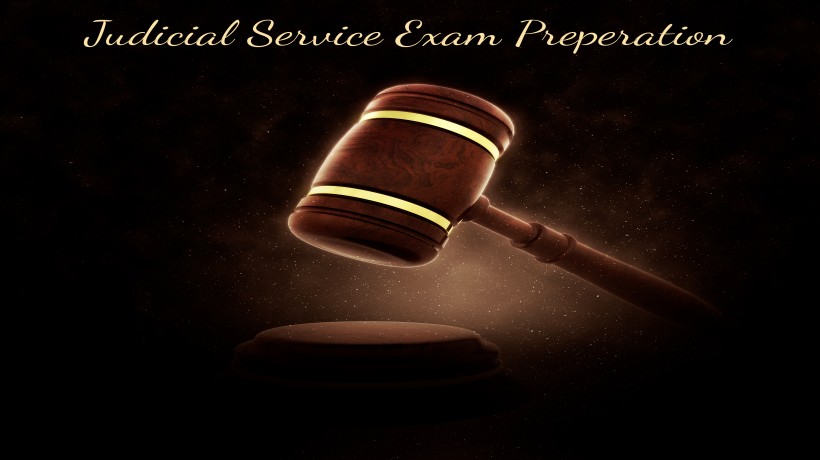The Judicial Service Exam Preparation and Eligibility Criteria
Remember, there is no short-cut to success, one need to be flexible as well as focused enough to clear any service exam, and Judicial Service Examination is one of them which demand your honest confession of consistency.
September 28, 2021

Career Expert & Blogger

The Judicial Service Examination
Judicial Services Examination, which is often known as the PCS (J)-Provincial Civil Service-Judicial Examination, is an entry-level exam for graduates from the field of law to become a member of the lower judiciary department. Based on this competitive exam, the state governments assign the members of the lower judiciary. The entire process, i.e., from the conduction of examination until the hiring, should be preceded under the guidance of the respected high courts.
The increased number of aspirants appearing for the examination has increased the competition level. Thus, if you are preparing for the first time, it is recommended to take proper coaching. However, during this pandemic condition, as all the classes are suspended until further notice, one can go for the Online Coaching Classes for Judiciary exam, easily available across the internet platform.
Eligibility Criteria for Judicial Service Examination
- For Lower Judiciary Services:
- LLB degree for appearing in the exam.
- Enrolment as an Advocate under the Advocates’ Act 1961 or at least should be eligible to be enrolled in the act.
- The approximate age limit for the examination is 21-35 years, may differs across different states.
- For Higher Judiciary Services:
- The minimum qualification for taking the exam for higher judiciary services is LLB, i.e., one must have completed his/her graduation in law.
- Experience is also required in the field; a minimum seven years in litigating practice.
Stages of Judicial Service Examination:
Three successive stages are followed:
- Preliminary
- Mains
- PI Round, i.e., Interview Round
The prelims can be understood more as a screening for the Second round, i.e., the mains exam. The prelim exam follows an objective type question pattern. The qualifying marks differ among the different states. It, taking us to the mains examination then, it is a subjective exam comprising of three to four papers. The marks secured here are counted for the finals. Last but not least, Personal Interview is the final stage of selection. All the states have different syllabus for the examination.
Preparation for Judicial Service Examination: To begin with the preparation, one must understand the syllabus and the exam pattern first. India, being the third-largest online market for education globally, enables the students to take better advantage of the resources available online. Thus, if you feel financially constrained to join the expensive coaching’s, then you can access a better learning experience over the virtual platform. Online Coaching Classes for Judiciary are readily available to take advantage of, especially in the ongoing COVID scenario.
Best Reference books for preparing judiciary exam-
- Remember these are reference books, one need to be thorough with Bare Acts before Jumping to Reference Books.
- Constitution of Indian - Constitution Bare Act / Mp jain / MP Luxmikant.
- Code of Civil Procedure - C.K Takwani
- Internal Penal Code - K.D Gaur
- Code of Criminal Procedure - CrPc Bare Act
- Indian Evidence Act - Batuklal
- Indian Contract Act - R.k Bangia / Contract Bar Act
- Hindu Laws - Hindus Law Bare Acts / Paras diwan
- Muslim Laws - Akil Ahmed
- Transfer of Property Acts - TPA Bare Act / Poonam Prashant.
- Specific Relief Act - SRA Bare Act.
- Limitation Act - Limitation Bare Act / J.D Jain
- Negotiable Instrument Act - NIA Bare Act.
- Best book for the law of Torts - R.K Banghiya
Some Important Points:
1. Setting Your Aim: First of all, set your aim for being selected as a Judicial Officer and becoming so in your life. Then proceed further in this regard with the consistent, well-planned and systematic preparation by preparing a well-planned, convenient & suitable time-table coupled with hard-work and strict discipline. If you have advantage of availability of some Judicial Officer recently selected and appointed in the State concerned where you wish to appear, try to seek his advice & guidance, which is very much helpful and crucial in the direction of your preparation.
2. Read Bare Acts first and then move to Reference Books: Have mastery over the subject/law by exhaustively & intensively studying and assimilating the Bare-Acts concerning the subjects of the examination without ignoring anything.
3. Flexible and Meaningful Strategy as per Exams: Each type/tier of the examination requires distinct strategy of its preparation. For the Preliminary Test, it requires intensive study without ignoring anything like illustrations, provisos, specially provided period of limitation, time/period-limits etc., while the Written Test, it requires a selective study particularly on the basis of the frequently asked questions by solving and practising to solve them and getting the same checked by your seniors.
4. Previous Year Paper: Practise the previous and model practice-papers of the various examinations conducted by the various Public Service Commissions and High Courts for cultivating habit of and mastering the time-management as if you were appearing at the examination at the Examination-Hall for ensuring that no question [wholly or partly] is remained un-attempted particularly in the Written [Main] Examination.
5. Discussion is the Key: Discuss the topics/problems with your peers, colleagues and seniors without any hesitation and shy. Unless you discuss the topics/problems, your doubts and hesitation shall not be won over. Think of various practical & hypothetical circumstances on the topics/problems.
6. Notes Preparation: Prepare own notes in your own language covering all the legal ingredients & essentials. Further supplement your notes with the latest judicial pronouncements rendered by the Hon'ble Supreme Court and the Hon'ble High Court/s by noting the Ratio-Decedendi by mentioning the name of the case. Regularly & frequently revise the Notes and make necessary corrections and improvements in the same.
7. Judgement Writing: In a week visit side of the website of the State High Court concerned and its sub-ordinate courts for writing Judgments/ Orders and framing of Charge and Issues. This part of the examination can be prepared from here by practising & writing.
8. Language Part: For Language, read some standard book of Grammar of the language concerned along with News-Papers, Magazines and Judgments rendered by the Hon'ble Supreme Court and the Hon'ble High Court/s. It helps in preparing précis-writing, translation and Essay-writing.
9. General Knowledge & Legal General Knowledge: Read relevant part of News-Papers, Magazines and Judgments rendered by the Hon'ble Supreme Court and the Hon'ble High Court/s and some standard book of General Knowledge & Legal General Knowledge available in the market.
Write a Comment


